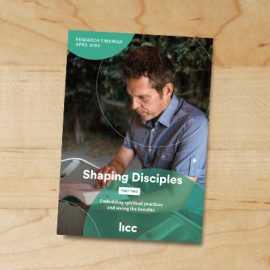RESEARCH: The role of spiritual practices in whole-life discipleship
First part of in-depth ‘Shaping Disciples’ research reveals the day-to-day benefits of disciples’ current engagement with spiritual practices. ...
Read

In 2022, we recruited 82 Christians of different ages from around the UK to take part in a 12-week research project. It was the second instalment of Shaping Disciples, a project exploring the impact spiritual practices have on the way Christians live out their faith.
A spiritual practice is an intentional habit designed to help disciples deepen their faith, shape their character, and integrate faith into daily life – like Bible reflection, the prayer of Examen, and breath prayers.
We taught our participants four practices to see how they got on with embedding them in their lives, and what difference it made to their everyday discipleship. You can read the full report and check out a quick summary of the key findings – but in essence, we discovered that embedding spiritual practices into daily life helps people live more like Jesus (funny, that!).
So, maybe you’ve read the Shaping Disciples report or the summary blog, and now you’re utterly convinced spiritual practices are exactly what you need to help you follow Jesus in your everyday life. Or maybe you already thought that.
Either way, let’s say you now find yourself saying ‘yes’ to spiritual practices. Yes, I would like to engage with the Bible and connect it to my everyday life. Yes, I would like to find ways to reflect on my day and pray more. Yes, I would like to find ways to remind myself who God is and who I am as I go about my day.
But your ‘yes’, if not thwarted, is at least tempered by a ‘but’. But I’m too busy. But I lack discipline. But I’m not motivated enough.
In the research we did, many of the participants said similar things about themselves. And yet, many of them made great progress. So here are four things they discovered that might help you get spiritual practices embedded into your life in a way that sticks.
(P.S. If you’re a church leader and want tips for helping people in your congregation engage with spiritual practices, we’ve got another blog on just that!)
Receiving grace
One of the biggest hamstringers to growth is guilt. While guilt can be helpful as an acute feeling to prompt repentance, it’s terrible when it becomes a chronic disposition.
During the research process, many participants became aware how much guilt had been holding them back. Through the surveys and conversations, words like ‘should’ and ‘failure’ came to the surface with disturbing regularity. Participants recognised just how unhelpful the weight of guilt is in creating positive change.
Those who fared best in regularly engaging with practices took the practices seriously, but remained rooted in God’s grace. Like this busy dad:
‘I try not to get bogged down in things or hold on to things too tightly; I just try to go with the flow, really. And if something is forgotten one day, then pick it up the next, or the day after that. God doesn’t mind. You don’t want to be casual about it, but on the other hand, just pick up where you can and keep it going.’
The depth of God’s love and the riches of his mercy for you are not dependent on how many minutes you spend reading the Bible, or how many times a day you pray! We do those things in response to God’s love, not to earn it.
Fuelling desire
When it comes to habits such as praying and reading the Bible, we sometimes think, ‘The reason I should do these things is because I should do these things.’ That sentence is not a typo! We’ve heard spiritual practices are important for Christians to do, but we don’t know why. If we have a compelling why, we’re much more likely to persevere in finding a how!
If we know that practices serve a purpose (i.e. they help us become more like Jesus), we are more likely to start doing them, and keep going with them. Knowing the ‘why’ sparks the fire, then adds chunky logs to the flames.
As one participant said, ‘I think what helped me to keep going was seeing the fruit of the practices, seeing the difference that they were making to my week. That’s a real motivator, because you see the potential effect the practices can have.’
Finding a spot
I’m sure you’ve been on both ends of this: you’re talking to someone, and one of you says, ‘It would be great to have you over for a meal sometime’. Months pass. The meal never happens. Why? Because you didn’t find a date. Intentions don’t make things happen; plans do.
Very early on in the research, it became apparent that those who identified a spot for their practices were far more likely to get started, and to keep motoring on.
The spot could be a specific time: ‘I read the Bible every day from 08:25 to 08:40.’
It could be a specific place: ‘As soon as I get into bed, I spend some time reflecting and praying about my day.’
It could be immediately before or after a particular action: ‘When I’m waiting to log on to a video call, I remind myself of who I am, and who God is calling me to be.’
It could be feeling a particular emotion: ‘Whenever I physically feel anxious or stressed, I pray a breath prayer.’
If you want to build a practice into your day, where’s a good spot for it to go?
Responding flexibly
Having a regular spot for your practice is great – maybe even essential. But life does not take place in a vacuum. Plans get interrupted: a bad night’s sleep, a trip away, a last-minute deadline, a child who won’t sleep.
There are some days when the practice just ain’t gonna happen. But often, with a little flexibility, we can still do something rather than nothing. Perhaps our planned 20 minutes of Bible reading today might end up being three and a half minutes. Or maybe you take five minutes to reflect on your day on the journey back from work, knowing you’ve got guests tonight so you won’t be able to do it after dinner.
Participants who engaged with practices most regularly demonstrated flexibility with when and how they did the practices.
Moving forward
If you’d like to learn some practices specifically designed to help you live more fruitfully in your everyday life, check out section 2 of the report. Or if you feel like you’re ready to get cracking, identify the spot (or spots) for your practice, and get experimenting. Approach your journey with practices as a learner – someone willing to try things out, to see how things go, and to make tweaks along the way.
It’s fine to go it alone, but you might benefit from the encouragement and accountability of someone else to travel with you. Who might that be? Perhaps you could forward them this article, along with the quick summary of the key findings, and take things from there.
We’d love to hear how you get on. Share your experiences with us.
—
Joe Warton
Researcher, writer, and coach

I long to go deeper with God not just skate along on the surface of relationship.